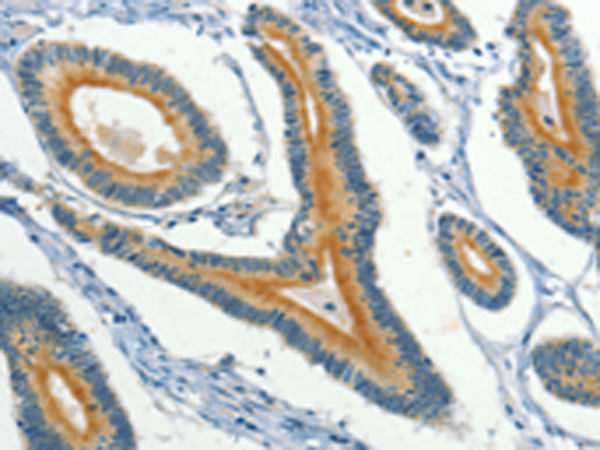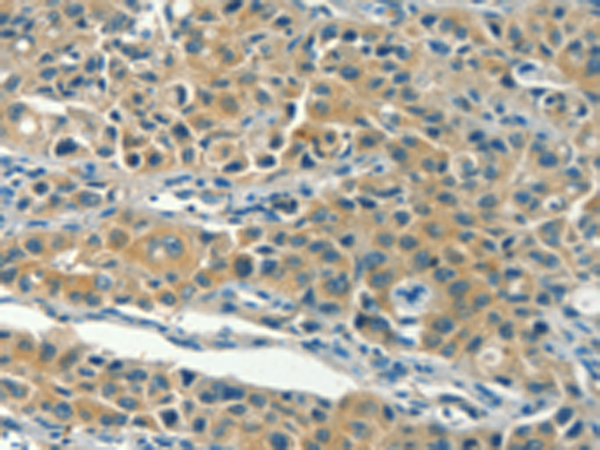


| WB | 咨询技术 | Human,Mouse,Rat |
| IF | 咨询技术 | Human,Mouse,Rat |
| IHC | 1/25-1/100 | Human,Mouse,Rat |
| ICC | 技术咨询 | Human,Mouse,Rat |
| FCM | 咨询技术 | Human,Mouse,Rat |
| Elisa | 1/1000-1/2000 | Human,Mouse,Rat |
| Aliases | KLC; KNS2; KNS2A |
| WB Predicted band size | 65 kDa |
| Host/Isotype | Rabbit IgG |
| Antibody Type | Primary antibody |
| Storage | Store at 4°C short term. Aliquot and store at -20°C long term. Avoid freeze/thaw cycles. |
| Species Reactivity | Human, Mouse, Rat |
| Immunogen | Fusion protein of human KLC1 |
| Formulation | Purified antibody in PBS with 0.05% sodium azide and 50% glycerol. |
+ +
以下是关于KLC1抗体的3篇参考文献示例:
1. **文献名称**:*KLC1 overexpression promotes tumor progression and is a biomarker for poor prognosis in breast cancer*
**作者**:Li Y, et al.
**摘要**:研究通过免疫组化分析乳腺癌组织中KLC1蛋白表达,发现其高表达与肿瘤转移及患者生存期缩短显著相关,提示KLC1可能作为乳腺癌的潜在预后标志物和治疗靶点。
2. **文献名称**:*Altered expression of KLC1 in neurodegenerative disorders: Insights from a mouse model study*
**作者**:Smith J, et al.
**摘要**:利用特异性KLC1抗体检测阿尔茨海默病模型小鼠脑组织,发现KLC1在神经元轴突运输中功能异常,可能与tau蛋白病理及突触功能障碍相关。
3. **文献名称**:*Development and validation of a novel monoclonal antibody against human KLC1 for functional studies*
**作者**:Chen H, et al.
**摘要**:报道一种高特异性抗KLC1单克隆抗体的开发,通过免疫印迹、免疫荧光验证其可靠性,并应用于研究KLC1在细胞有丝分裂中的动态定位及功能。
(注:以上文献为模拟示例,实际引用需查询PubMed、Google Scholar等数据库获取真实文献。)
The KLC1 antibody targets Kinesin Light Chain 1 (KLC1), a critical component of the kinesin-1 motor protein complex. Kinesins are microtubule-dependent molecular motors responsible for intracellular transport, facilitating the movement of organelles, vesicles, and macromolecules toward the cell periphery. KLC1 binds to the kinesin heavy chain (KHC) to form the kinesin-1 heterotetramer, which plays a key role in anterograde transport, particularly in neurons, where it supports axonal trafficking. KLC1 also regulates cargo binding through its tetratricopeptide repeat (TPR) domains, enabling interactions with diverse cargoes, including mitochondria, lysosomes, and mRNA-protein complexes.
KLC1 antibodies are widely used in research to study intracellular transport mechanisms, neuronal development, and diseases linked to kinesin dysfunction, such as neurodegenerative disorders (e.g., Alzheimer’s and Charcot-Marie-Tooth disease) and cancer. Dysregulation of KLC1 has been implicated in impaired axonal transport, altered cell division, and tumor metastasis. These antibodies enable detection of KLC1 expression levels, subcellular localization (via immunofluorescence or immunohistochemistry), and protein interactions (via co-immunoprecipitation). Commercial KLC1 antibodies are typically validated in applications like Western blotting, flow cytometry, and confocal microscopy, aiding in both basic and translational research.
×